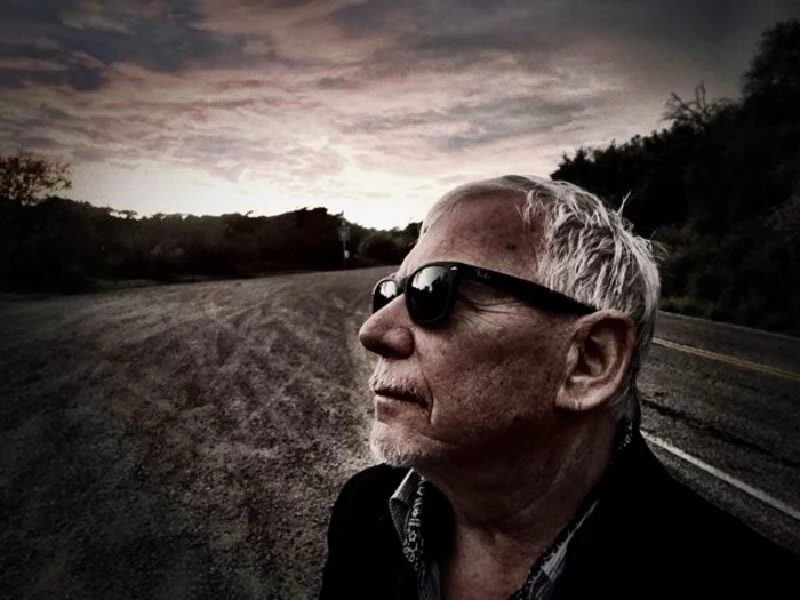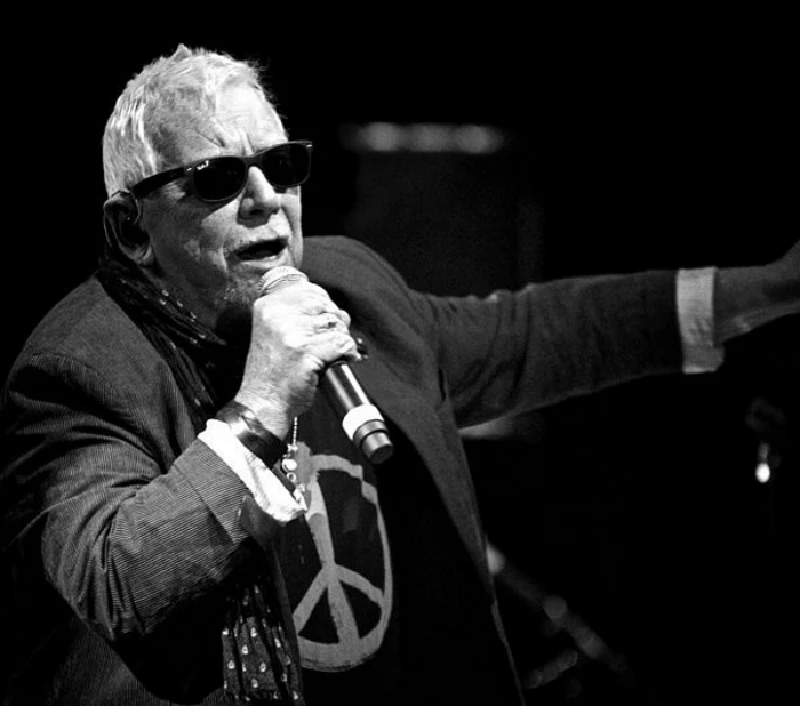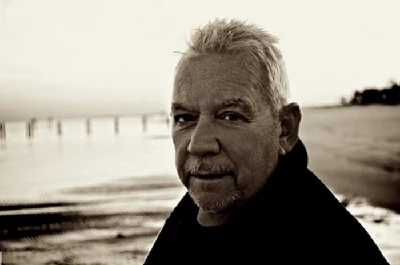Eric Burdon - Interview
by Lisa Torem
published: 5 / 2 / 2016

intro
60's icon and Animals front man Eric Burdon speaks with Lisa Torem about performing, improvising and the influence of his Newcastle upbringing
With the Animals, Eric Burdon’s bourbon-scorched vocals, rebellious, outsider lyrics and grinding riffs spoke to a culture-thirsty core of teenagers in the mid-1960s that craved visibility and validation. Songs like ‘We’ve Got To Get Out of This Place,’ painted gripping images of vulnerable, disenfranchised youth, snarled by injustice, who, by the skin of their teeth, rose above adversity with some kind of plan. Perhaps the song that most reflects Eric Burdon’s independence and distinctive way of communicating across racial, gender and generational lines is ‘It’s My Life’. Imagine being a marginalized 17-year-old and hearing the empowering-but-threatening bass line, that boosts Burdon’s tale of self-reflection, for the very first time. It’s a game-changer for youth of any era. Burdon’s legacy began with the British Invasion. Peter Noone and Paul McCartney were the innocents; Eric Burdon and Mick Jagger claimed the wrong side of the tracks. Burdon’s face has always held the stage; his career has included numerous acting gigs, and whether one watches him in person or on a video, his masculine presence dominates the medium. Burdon adored and drew great inspiration from American blues and jazz artists: Ray Charles, Nina Simone, Bo Diddley, etc. When the Animals supported Chuck Berry on the road, the Newcastle front man knew better than to impress Berry with copycat riffs or sophisticated lyrics. Instead they drove a stake through the heart of the folk song, ‘House of the Rising Sun’, creating a heart-thumping blues masterstroke. Did Burdon create socio-political movements or reflect them in his choice of material? His songs have always raised questions. Many say that ‘Sky Pilot’ and ‘San Francisco’ fueled the Vietnam anti-war movement on America’s torn-apart West Coast. In 1993 on ‘Access All Areas,’ Eric sang the harrowing ‘Tobacco Road’, depicting a solemn avenue of desperation. Who were these characters that Eric Burdon insisted we visit? Were they shadows of ourselves or strangers? Did the spoken word salad ‘Spill the Wine’ which Eric recorded with the percussive, genre-blurring War, foreshadow rap? Maybe the focus wasn’t on rhyme per se, but isolating the narrative from an actual melody was unusual for the time. Nobody had heard anything like it, but Eric always either wrote or took great care to cover a distinctive arrangement, whether it was the aforementioned ‘It’s My Life’, penned by Brill Building team Roger Atkins and Carl D’Errico or ‘Don’t Let Me Be Misunderstood’ by writers: Bennie Benjamin, Gloria Caldwell and Sol Marcus, recorded by Nina Simone in 1964 and revved up a year later by the Animals. Eric never forgot the artists that inspired him. He paid tribute to as many as he could in ‘Soul of a Man’ in 2006, recapturing the insightful, political overtones of ‘Red Cross Store’ by Mississippi Fred McDowell. It’s been a while since Eric has performed in Chicago; he jammed with and supported local blues artists during the screening of a Paul Butterfield documentary not that long ago, but excitement builds as news unfolds that the legend will return… Burdon is currently on the road with a new line-up of the Animals. At his Chicago set, he wears film noir black from head to toe; a flowing, snow-white scarf is draped around his neck. Although he has been suffering from a head cold, he gives his all to every song, delivering as much passion as is humanly possible, despite feeling ill. He jokes with his band mates and taunts them with his vocal antics and is rewarded with screeching keyboards, robust percussion and jagged electric guitar. There are few audiences that don’t know the hits by heart. He sings a few: ‘Water’ and ‘Bo Diddley Special’ from 2013’s ‘Til Your River Runs Dry’ and finishes with a classic encore. On that recording, this Hall of Famer wrote or co-wrote ten of the dozen tracks. Looking over this year’s schedule, it appears that there are no free moments in which to pencil in a cleansing breath--Eric Burdon’s website makes us keenly aware of his mad-paced life: As busy as he is, though, with international touring, recording and environmental involvement, Eric agrees to an updated interview with Pennyblackmusic. It’s our end-of-the-year holiday edition and we couldn’t have been graced with a better gift. When we catch up with Eric Burdon, he discusses arranging and performing and the essential lesson he learned early on in Newcastle. Read on… PB: You sang and played the trombone in the Pagan Jazzmen in your early years. Do you feel that playing the horn influenced your singing style then or over the years? EB: Brass instruments are the closest to the human voice. I think that jazz – listening to it and playing it – influenced my singing and still influences my phrasing to this day. I still phrase my vocals like a trombone. Playing a trombone takes a lot of lungpower and for a kid with asthma it showed me that I could reach down into my gut and produce a strong sound. PB: I imagine that growing up in Newcastle during WWII meant that your family had to ration. Your song ‘Water’ reminds us of our obligation to conserve resources, but does it also rekindle early childhood memories? EB: The UK was in tremendously bad shape after the war. Growing up in post-war England taught me to ration everything, from sugar to petrol. We had food rationing until 1953 or even longer. I never ate a banana until I was fifteen years old. Thanks to Canadians, we had apples. The Nazis cut off supplies to the UK and the US soldiers brought candy bars to win the hearts of the youth and nylons for the ladies. To this day, I hate to see waste. Water is going to become more and more scarce and the future of many parts of the world will be seriously affected. Many places will not be able to produce food as temperatures increase and wars may be fought over water. So, it’s a matter that should be of concern to us all. PB: You performed at Chicago’s City Winery and had onstage two percussionists. You also played percussion. When you map out your vocal arrangements, do you think in beats or melodies? How do you explain to your band the overall sound you want onstage? EB: James Brown treated every instrument as a percussion instrument, including his voice. That’s where you get horns that play ‘tat-tat-tat.’” It makes for a multi-layered tapestry of rhythms. Today, it’s usually done with machines but I stay true to more natural rhythms. That’s where the groove comes from. To say I performed at City Winery is an overstatement. I lost my voice there for the first time ever, due to a really bad cold. PB: You mentioned meeting vocalist Nina Simone during a gig. What made her special? What other musicians have inspired you? EB: When we met she called me “that little British fucker who ruined her song” but I think she came to understand the respect I had for her. Nina Simone was fearless in her life and her work, which were inseparable. She had the power to bring black politics into popular music but she was never respected for what she considered her greatest talent, playing piano. She made every breath of her life and work a statement for justice and equality. I saw white audiences freeze with fear at her concerts when she performed certain songs, like ‘Mississippi Goddamn’ and ‘Pirate Jenny’. PB: The audience always recognizes ‘House of the Rising Sun’ by the first, few guitar chords. It’s still a much-loved classic. Can you imagine it being done by a rap or reggae artist? EB: I’m sure it has been done reggae style and rap, as well. Recently, I heard about a Peruvian Indian who translated the song to her native tongue, with the help of her grandmother, to help preserve their dying language. A song like that is universal and can be done in any style but its roots are in English and Irish folk that go back for centuries. PB: You and the Animals have been touring the U.S. and Europe this year non-stop, playing everything from casinos to festivals to intimate music halls. What performance situation pleases you the most? EB: I like all types of situations, except playing in the blazing sun or too close to farm animals or loud vehicles, which you get sometimes at county fairs. One thing I find disturbing is having uniformed security people who are too heavy-handed. An intimate setting is nice because you can see the whites of the audience’s eyes but the ideal is having three to four thousand people, with a good PA system, where the performer can reach everyone. PB: What is the most memorable thing a fan has ever said to you? EB: One guy came up to me after a show and said, “I want to thank you. You saved my life.” I’d heard such comments from Vietnam Vets before so I smiled and thanked him. He grabbed my hand and told me, “No. You really saved my life.” Then he told me what happened. He said, “I went to grab a cassette that my mother had sent me of 'We’ve Got to Get Out of This Place'. By the time I picked up the cassette and made it back to my company, they had been completely wiped out. I was the only survivor. You really saved my life.” PB: You mentioned reading ‘Field of Prey’ on your website. What’s on your coffee table tonight? EB: The biography of John Le Carre. PB: You’ve written your life story and performed all over the world. What remains on your bucket list? EB: I’m too busy living my life to have a bucket list. I’m currently working on a third volume of my memoirs – which will also be released as a spoken word recording and then I return to Australia in May. I’m thinking of going back into the studio. I live my life to the fullest and I’m still making plans for the future. PB: If your house were on fire, would you first scream, ‘We’ve Got to Get Out of This Place’, ‘Water’ or ‘Spill The Wine’? EB: I’ve had three fires at three different locations and I don’t recall singing anything at the time! PB: Thank you. Photographs © Marianna Burdon
Band Links:-
http://www.ericburdon.com/https://www.facebook.com/OfficialEricBurdon
https://twitter.com/ericburdon
Picture Gallery:-

interviews |
|
Interview (2013) |

|
| Lisa Torem chats to 60's blues legend Eric Burdon about his new album, 'Til Your River Runs Dry' |
| Interview (2010) |
live reviews |
|
Festival Park, Elgin, Illinois, 24/8/2013 |
| Lisa Torem watches 60's blues veteran Eric Burdon with a new line-up of the Animals play a tight set of classic and new material at Festival Park in Elgin, Illinois |
| Naperville Rib Fest, Naperville, 3/7/2010 |
most viewed articles
current edition
Peter Doherty - Blackheath Halls, Blackheath and Palace Halls, Watford, 18/3/2025 and 21/3/2025Armory Show - Interview with Richard Jobson
Liz Mitchell - Interview
Lauren Mayberry - Photoscapes
Deb Googe and Cara Tivey - Interview
Max Bianco and the BlueHearts - Troubadour, London, 29/3/2025
Garfunkel and Garfunkel Jr. - Interview
Maarten Schiethart - Vinyl Stories
Clive Langer - Interview
Sukie Smith - Interview
previous editions
Heavenly - P.U.N.K. Girl EPBoomtown Rats - Ten Songs That Made Me Love....
Trudie Myerscough-Harris - Interview
Doris Brendel - Interview
Beautiful South - Ten Songs That Made Me Love...
Dwina Gibb - Interview
Pulp - Ten Songs That Made Me Love...
Kay Russell - Interview with Kay Russell
Barrie Barlow - Interview
Sound - Interview with Bi Marshall Part 1
most viewed reviews
current edition
Davey Woodward - Mumbo in the JumboNigel Stonier - Wolf Notes
Wings - Venus and Mars
Kate Daisy Grant and Nick Pynn - Songs For The Trees
Only Child - Holy Ghosts
Neil Campbell - The Turnaround
Philip Jeays - Victoria
Darkness - Dreams On Toast
Suzanne Vega - Flying With Angels
Charles Ellsworth - Cosmic Cannon Fodder
Pennyblackmusic Regular Contributors
Adrian Janes
Amanda J. Window
Andrew Twambley
Anthony Dhanendran
Benjamin Howarth
Cila Warncke
Daniel Cressey
Darren Aston
Dastardly
Dave Goodwin
Denzil Watson
Dominic B. Simpson
Eoghan Lyng
Fiona Hutchings
Harry Sherriff
Helen Tipping
Jamie Rowland
John Clarkson
Julie Cruickshank
Kimberly Bright
Lisa Torem
Maarten Schiethart